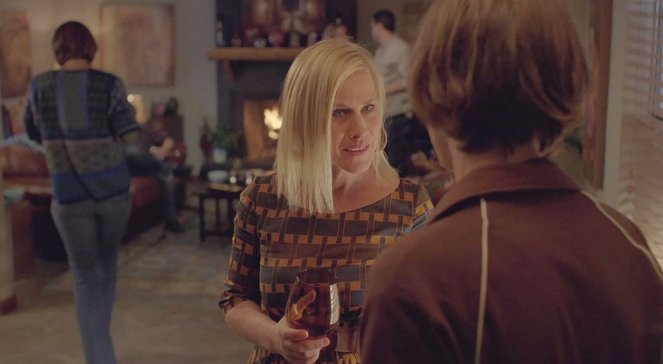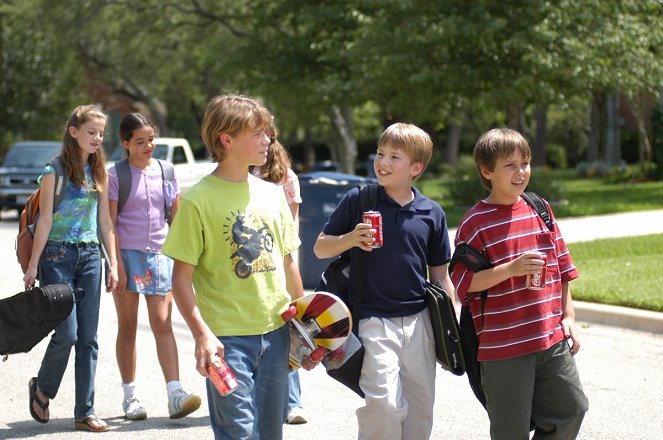Director:
Richard LinklaterGuión:
Richard LinklaterReparto:
Patricia Arquette, Ellar Coltrane, Lorelei Linklater, Ethan Hawke, Steven Chester Prince, Zoe Graham, Nick Krause, Evie Thompson, Tamara Jolaine (más)Streaming (3)
Sinopsis(1)
La película sigue a Mason (Ellar Coltrane) desde los seis años durante algo más de una década poblada de cambios, mudanzas y controversias, relaciones que se tambalean, bodas, diferentes colegios, primeros amores, primeras desilusiones, momentos maravillosos, momentos de miedo y una constante mezcla de desgarro y de sorpresa. Los resultados son totalmente impredecibles, ya que cada momento lleva a otro, uniéndose en la profunda experiencia personal que nos forma mientras crecemos y nos acoplamos a la siempre cambiante naturaleza de nuestra vida. La historia empieza cuando Mason, un soñador de seis años, se enfrenta a la primera gran convulsión de su vida: su entregada y luchadora madre Olivia (Patricia Arquette) ha decidido que se muda con Mason y su hermana Samantha (Lorelei Linklater) a Houston, justo cuando el padre de sus hijos, Mason Sr (Ethan Hawke) acaba de regresar a Alaska. Así empieza una vida de cambios. Entre una marea de padres y padrastros, novias, profesores, jefes, peligros, deseos y pasión creativa, Mason consigue encontrar su propio camino. (Universal Pictures España)
(más)Videos (10)
Reseñas (15)
Una historia de vida sin un solo momento que valga la pena rodar. Ya hemos visto todos esos fragmentos de vida en otros lugares, donde eran un ingrediente de un objetivo superior del guión. O los experimentamos en casa, por lo que son lo último que queremos ver en el cine. ¿Puede ser feliz una persona con una vida tan banal sin caídas y auges, si no ha conoce el dolor de perder a un ser querido o el sentimiento de amor absoluto? Todo el tiempo estuve esperando qué historias Linklater escribiría para los personajes, si dedicó 12 años a la creación de esta «película de la vida». Y nada. Por cierto, adoro la trilogía Before Sunrise/Sunset/Midnight, que es enfoca conscientemente y al mismo tiempo juguetonamente en un tema específico y lo presenta de manera tal que evoluciona a alguna parte.
()
Richard Linklater hizo la película de su vida. La mágica y nostálgica historia se estuvo rodando ininterrumpidamente durante doce años con los mismos actores que envejecieron con ella. Esto hace que la película sea única y merezca escribirse con letras de oro en la historia del cine. Y es maravillosa. Sin embargo, no puedo evitar la sensación de que si fuera una película corriente, hecha con un método normal, Boyhood (Momentos de una vida) en ningún caso sería tan buena. Es un poco lenta en algunos momentos y 166 minutos son muchos para un drama relativamente normal sobre la vida de una familia. Lo único encantador y extraordinario que tiene es la forma, por la que Linklater merece todas las ovaciones. Porque esto ya no es sólo una película, es la vida.
()
Linklater’s indie epic offers more than coming-of-age nostalgia, though in reviewing it, I cannot separate the qualities of the film itself from the values I ascribe to it based on memories of my own childhood. It is easy to find in Mason someone who lived the best years of his life a decade earlier and several thousand kilometres away. Perhaps this is evidence of the universality or perhaps the vagueness of the story and the poorly drawn protagonist. In the film’s defence, it can be said that the vagueness of the protagonist is related to his age – his identity is still being formed and, as the youngest member of his family, he has no choice but to be a passive observer of events. After all, Boyhood is not about heroes and their great deeds, as is confirmed by one of the last songs (“Hero” by Family of the Year) on the soundtrack. On the contrary, Linklater tells about the gradually muted desire to be a hero, to play a role in significant historical events and in doing so to find the meaning of human existence. Mason asks what the point of it all is. We will never find out for ourselves and there’s nothing left to do but to accept each present moment as the definitive answer. ___ For me, Boyhood is not just a story about one boy growing up, but also proof of Richard Linklater’s maturation as a director and screenwriter. The film gradually becomes more economical in terms of expression. Linklater uses longer shots, trusts the actors more and better chooses situations and dialogue that encapsulate the transformation of the relationship between the characters, which retrospectively relates to the maturation of the lead actor, who was later able to portray more complex emotions in one take. That doesn’t mean Boyhood gradually eliminated all of the flaws marring the unaffected nature of its content and the fluidity of its narrative. The contrived encounters (the Mexican labourer), the perfection of both parents, or rather the uncriticalness towards them, and the conspicuous presentation of the director’s ideological positions (Texas patriot, liberal Democrat with a lukewarm attitude toward guns and religion) all remain. ___ Despite a certain creative progress, the film – shot “the old-fashioned way” in 35 mm – retains a unique aesthetic uniformity that masks its twelve-year production history. Thanks to the use of the time-lapse method, however, Boyhood is the boldest example yet of Linklater’s original way of handling cinematic time (he previously made films set in a single night, one day or in real time) and use of documentary techniques. The continuously “flowing” Boyhood has an even less distinct dramatic arc than some of Helena Třeštíková’s time-lapse films, which work with more emotionally tense situations and major “plot” twists. ___ However, the film betrays the method of long-term shooting by one person when it repeatedly shows events that Mason is not present for. These minor betrayals of the concept bothered me more than the episodes that go nowhere (the schoolyard bullying) and the empty or repetitive dialogue, which conversely contribute to the authenticity of the finished form. We don’t always get to the point in life either. It may be a cliché, which is something that Boyhood largely avoids, but I will conclude by writing that Linklater’s wager on uncertainty resulted in one of the most convincing films about life. 85%
()
(menos)
(más)
Filming something for 12 years and deciding 12 years ago that the movie would take 12 years to make – that takes some goddamn balls. And Richard Linklater evidently has those. Clean-shaven and ready for us to evaluate his latest project. And I can’t help it but give it a full, five-star review. I mean this is something else. The director doesn’t really show me how the boy grows, or rather shows it in a very natural manner and in the end I didn’t really mind at all. I totally grew to like the boy over the two hours and a half. He really lived his life with everything that takes. With happiness as well as with falls. On top of that, his divorced parents Patricia Arquette and Ethan Hawke put in incredibly amazing performances. Obviously, I shouldn’t forget about Mason either, who is portrayed by Ellar Colltrane. What’s important is that over those two and a half hours, the boy grew before my very eyes. From a boy who was afraid to say anything, into a boy who has his own opinions and who’s not afraid to develop them further. The final scene on the beach was really strong. Life is slipping through our fingers and we must not let those chances that make life worth living get away.
()
This is a film I've always subconsciously wanted to see. Creative patience and the ability to capture in life exactly those fleeting moments that shape us further have produced quite possibly the most calculating film in history, but at the same time I can't imagine it could have been made one bit better. If I were a film theorist, I'd analyze it endlessly. At this point, I want to see it at least three more times.
()



Anuncio